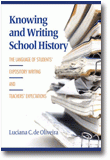
Knowing and Writing School History
The Language of Students' Expository Writing and Teachers' Expectations
By:
Luciana C. de Oliveira, Purdue University
Published 2011
Because school history often relies on reading and writing and has its own discipline-specific challenges, it is important to understand the language demands of this content area, the typical writing requirements, and the language expectations of historical discourse. History uses language is specialized ways, so it can be challenging for students to construct responses to historical events. It is only through a focus on these specialized ways of presenting and constructing historical content that students will see how language is used to construe particular contexts.
This book provides the results of a qualitative study that investigated the language resources that 8th and 11th grade students drew on to write an exposition and considered the role of writing in school history. The study combined a functional linguistic analysis of student writing with educational considerations in the underresearched content area of history. Data set consisted of writing done by students who were English language learners and other culturally and linguistically diverse students from two school districts in California. The book is an investigation of expository school history writing and teachers’ expectations for this type of writing. School history writing refers to the kind of historical writing expected of students at the pre-college levels.
CONTENTS
1 Background 2 Teaching, Learning, and Writing School History 3 History Teachers' Challenges and Reported Practices Using and Teaching Writing 4 Student Writing in History 5 Student Writing in History 6 Conclusions and Implications A Questionnaire B Interview 1 Questions C Interview 2 Questions References
REVIEWS
"De Oliveira offers novice and experienced teachers new ways to consider their students' writing, and through systemic-functional linguistics, she makes a valuable contribution to disciplinary literacy." Sarah Drake Brown Ball State University in Journal of Curriculum and Instruction
-
Paperback978-1-61735-336-9
Web price: $45.04 (Reg. 52.99)
-
Hardcover978-1-61735-337-6
Web price: $80.74 (Reg. 94.99)
- eBook9781617353383

- EDU037000 - EDUCATION: Research
- LAN005000 - LANGUAGE ARTS & DISCIPLINES: Composition & Creative Writing
-
 (Re)Envisioning Social Studies Education Research
Current Epistemological and Methodological Expansions, Deconstructions, and Creations
(Re)Envisioning Social Studies Education Research
Current Epistemological and Methodological Expansions, Deconstructions, and Creations
-
 American Educational History Journal - Golden Anniversary Edition
Volume 50 Numbers 1 & 2
American Educational History Journal - Golden Anniversary Edition
Volume 50 Numbers 1 & 2
-
 Distance Learning
Volume 20 #3
Distance Learning
Volume 20 #3
-
 Distance Learning
Volume 20 #4
Distance Learning
Volume 20 #4
-
 Faculty Development
Achieving Change Through Action Research
Faculty Development
Achieving Change Through Action Research
-
 Qualitative Research With Diverse and Underserved Communities
Qualitative Research With Diverse and Underserved Communities
-
 Quarterly Review of Distance Education
Volume 24 #1
Quarterly Review of Distance Education
Volume 24 #1

